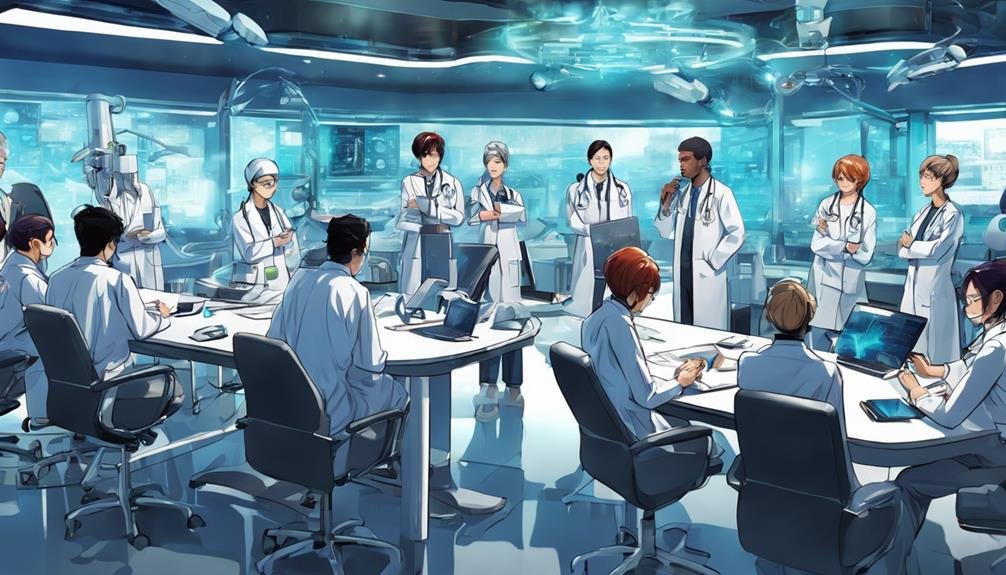How to Be More Innovative in Healthcare Solutions
You might not be aware that innovation in healthcare goes beyond just technology; it involves a holistic approach to problem-solving. By understanding the current challenges in healthcare and embracing cross-disciplinary collaboration, you can pave the way for groundbreaking solutions.
Curious to know how leveraging technology, adopting agile methodologies, and promoting a patient-centric approach can drive innovation in healthcare? Stay tuned to discover practical strategies to enhance healthcare solutions and make a real difference in the industry.
Key Takeaways
- Embrace technology advancements for transformative healthcare solutions.
- Cultivate diverse teams for innovative problem-solving.
- Prioritize patient feedback and personalize care plans.
- Revolutionize processes for streamlined, patient-centric care.
Importance of Innovation in Healthcare
Recognizing the critical role of innovation in healthcare, you must actively seek out new solutions to address evolving challenges and improve patient outcomes. Innovation's impact on the healthcare industry is undeniable. It has the power to revolutionize treatment methods, enhance patient care, and drive significant advancements in medical technology. By embracing innovation, healthcare providers can streamline processes, reduce costs, and ultimately save more lives.
Looking towards future trends, it's evident that innovation will continue to play a pivotal role in shaping the healthcare landscape. From telemedicine and wearable health technology to personalized medicine and artificial intelligence, the possibilities for innovation are endless. Embracing these future trends can lead to improved efficiency, better patient outcomes, and a more sustainable healthcare system overall.
Understanding Current Healthcare Challenges
In today's rapidly evolving healthcare landscape, it's imperative to grasp the current challenges facing the industry to pave the way for innovative solutions and improved patient care. Healthcare technology and future trends play a critical role in shaping the industry's landscape. Understanding these challenges is key to driving progress.
Here are some of the pressing issues that need attention:
- Rapid Technological Advancements: The constant evolution of healthcare technology requires adaptation and integration for seamless operations.
- Data Security Concerns: Safeguarding patient data in an era of cyber threats is a significant challenge that healthcare providers must address.
- Aging Population: As the population ages, healthcare systems face increased demands and strains on resources.
- Cost Management: Balancing quality care with rising costs is a persistent challenge in healthcare delivery.
- Regulatory Changes: Keeping up with changing regulations and compliance standards adds complexity to healthcare operations.
Leveraging Technology for Innovation
Amidst the dynamic landscape of healthcare, harnessing the power of technology is paramount for fostering innovation and driving transformative change in patient care delivery. Technology integration plays a pivotal role in enhancing healthcare solutions. By leveraging digital transformation, healthcare providers can streamline processes, improve data accuracy, and enhance communication between patients and healthcare professionals. Innovation workshops and idea generation sessions provide valuable platforms for brainstorming new technological solutions to address healthcare challenges effectively.
Through technology integration, healthcare organizations can implement electronic health records (EHRs) systems, telemedicine platforms, wearable health devices, and artificial intelligence tools to enhance patient care delivery. These innovations not only improve efficiency but also enable more personalized and precise care for patients. Additionally, leveraging technology can lead to cost savings, improved patient outcomes, and increased accessibility to healthcare services.
Encouraging Cross-Disciplinary Collaboration
To foster innovation in healthcare solutions, you must encourage cross-disciplinary collaboration.
By bringing together individuals from diverse backgrounds and expertise, you open up avenues for creative idea exchange.
This synergy of perspectives can lead to groundbreaking advancements in the field of healthcare.
Team Diversity Benefits
Diverse teams in healthcare foster a rich environment for cross-disciplinary collaboration, leading to innovative solutions that address complex challenges effectively. When it comes to team diversity benefits, consider the following:
- Diversity Inclusion: Embracing various backgrounds and perspectives enhances creativity.
- Enhanced Team Dynamics: Different skill sets and experiences complement each other.
- Collaborative Innovation: Working together across disciplines sparks fresh ideas.
- Creative Problem Solving: Diverse teams approach issues from various angles, finding unique solutions.
- Improved Decision Making: A mix of viewpoints leads to well-rounded choices for better outcomes.
Creative Idea Exchange
Fostering a culture of creative idea exchange in healthcare settings encourages cross-disciplinary collaboration, propelling teams towards innovative solutions to complex challenges. Brainstorming sessions play a pivotal role in idea generation by bringing together professionals from various fields to share their perspectives and expertise.
During these sessions, different team members can contribute unique insights, sparking creativity and pushing boundaries. By creating an environment where individuals feel empowered to voice their ideas freely, healthcare organizations can tap into a wealth of knowledge and creativity.
This collaborative approach not only leads to the development of more effective solutions but also fosters a sense of unity and shared purpose among team members, ultimately driving positive outcomes in healthcare innovation.
Embracing a Patient-Centric Approach
Embracing a patient-centric approach in healthcare requires a fundamental shift in mindset towards prioritizing the individual's needs and preferences above all else. This approach focuses on enhancing the overall patient experience by actively involving them in their care journey.
Here's how you can guarantee a patient-centric approach:
- Encourage Patient Feedback: Actively seek and listen to feedback from patients to understand their concerns and improve services accordingly.
- Enhance User Experience: Design healthcare processes and systems with a user-friendly approach to make it easier for patients to navigate through their care.
- Personalize Care Plans: Tailor treatment plans to meet the unique needs and preferences of each patient, fostering a sense of individualized care.
- Promote Shared Decision-Making: Involve patients in the decision-making process regarding their treatment options, empowering them to be active participants in their healthcare.
- Guarantee Clear Communication: Maintain open and transparent communication with patients to keep them informed about their care plans and progress effectively.
Investing in Research and Development
To drive innovation in healthcare solutions, directing resources towards research and development is imperative. Investing in R&D not only fosters creativity but also propels the industry forward. One of the critical aspects of investing in research and development is seizing funding opportunities. By actively seeking out grants, partnerships, and governmental support, healthcare organizations can fuel their innovative initiatives and push boundaries.
Innovation challenges within the healthcare sector are diverse and complex. From regulatory hurdles to technological limitations, steering these obstacles requires a dedicated focus on R&D. Investing in cutting-edge technologies, such as AI and precision medicine, can revolutionize patient care and streamline processes. However, these advancements come with their own set of challenges, including data security concerns and ethical dilemmas.
Adopting Agile Methodologies
Implementing Agile Methodologies in healthcare operations can enhance adaptability and efficiency in response to dynamic challenges and evolving patient needs. By adopting Agile practices, you can foster an innovation mindset and improve problem-solving abilities within your team dynamics.
Here are some key points to ponder:
- Agile implementation: Embrace iterative approaches to project management, allowing for flexibility and quick adjustments to changing requirements.
- Team collaboration: Encourage open communication, feedback sharing, and a sense of collective ownership to boost productivity.
- Continuous improvement: Emphasize the importance of regular reflections on processes and outcomes to drive enhancements.
- Adaptability: Develop a mindset that welcomes change and values the ability to pivot swiftly in response to new information.
- Customer focus: Prioritize patient needs by incorporating feedback loops and user testing to ascertain solutions align with real-world requirements.
Promoting Continuous Learning and Development
When it comes to promoting continuous learning and development in healthcare, prioritizing training for innovation and skill enhancement programs is crucial.
By offering opportunities for ongoing education and growth, healthcare professionals can stay abreast of the latest advancements and techniques in the field.
Embracing a culture that values continuous learning not only benefits individuals but also contributes to the overall advancement of healthcare solutions.
Training for Innovation
Embracing a culture of continuous learning and development is essential for fostering innovation within healthcare organizations. To train for innovation effectively, consider the following strategies:
- Innovation Workshops: Encourage participation in workshops to spark new ideas and collaborative thinking.
- Brainstorming Sessions: Foster creativity by providing a platform for sharing and refining innovative concepts.
- Problem Solving Exercises: Engage in exercises that challenge individuals to think critically and develop solutions.
- Creativity Training: Offer training sessions focused on enhancing creative thinking skills and exploring unconventional approaches.
- Cross-Functional Collaboration: Encourage collaboration across different departments to leverage diverse perspectives and expertise.
Skill Enhancement Programs
To further cultivate a culture of innovation within healthcare organizations, consider the implementation of Skill Enhancement Programs focused on promoting continuous learning and development. Skills development is vital in staying abreast of the latest advancements in healthcare.
Training programs tailored to the specific needs of healthcare professionals can enhance their expertise, ultimately leading to more innovative solutions. By investing in Skill Enhancement Programs, organizations empower their employees to acquire new skills, adapt to changes in the industry, and think creatively about problem-solving.
These programs not only benefit individual employees but also contribute to the overall progress and success of the organization. Emphasizing continuous learning and development through such initiatives fosters a dynamic and forward-thinking environment within healthcare institutions.
Cultivating a Culture of Innovation
Cultivating a culture of innovation within healthcare organizations requires a strategic approach that fosters creativity and embraces experimentation. To achieve this, consider the following key points:
- Innovation Workshops: Organize regular workshops where team members from diverse backgrounds can come together to brainstorm ideas and solutions. Encouraging open communication and collaboration can spark innovative thinking.
- Brainstorming Sessions: Conduct regular brainstorming sessions where employees are encouraged to think outside the box and share their unique perspectives. This can lead to the generation of creative solutions to healthcare challenges.
- Leadership Support: It's vital for leaders to actively support and promote a culture of innovation within the organization. When leadership values and prioritizes innovation, it sets the tone for the entire team.
- Resource Allocation: Allocate resources such as time, budget, and tools to support innovative projects. Providing the necessary resources can empower employees to turn their innovative ideas into tangible solutions.
- Reward Innovation: Recognize and reward employees who actively contribute to innovation within the organization. Acknowledging innovative efforts can motivate others to think creatively and contribute to a culture of innovation.
Measuring Success and Iterating for Improvement
When evaluating the success of your healthcare solutions, consider implementing various measurement techniques to gauge effectiveness. Continuous improvement strategies should be at the forefront of your efforts, allowing for iterative enhancements based on data-driven insights.
Success Measurement Techniques
Implementing effective success measurement techniques is essential for evaluating the impact of healthcare innovations and driving continuous improvement. When measuring success in healthcare solutions, consider utilizing data analytics and performance metrics to track progress accurately.
Here are five innovative techniques to measure success effectively:
- Utilize Key Performance Indicators (KPIs)
- Implement Real-Time Monitoring Systems
- Leverage Patient Feedback and Satisfaction Surveys
- Conduct Comparative Analysis with Industry Benchmarks
- Employ Outcome-Based Evaluation Methods
Continuous Improvement Strategies
To drive continuous improvement in healthcare solutions, focus on refining success measurement techniques and iterating for enhancement.
Utilizing the Kaizen approach and Lean methodology can aid in streamlining processes and identifying areas for enhancement.
Implementing rapid prototyping and iterative design allows for quick testing and modification of solutions based on real-time feedback.
By continuously measuring the success of implemented strategies and iterating on them, you can adapt to the ever-evolving healthcare landscape efficiently.
This approach not only helps in addressing current challenges but also prepares healthcare solutions for future demands.
Embracing a culture of continuous improvement through these strategies fosters innovation and guarantees that your healthcare solutions remain effective and relevant.
Conclusion
To sum up, in order to truly innovate in healthcare solutions, you must think outside the box and break the mold. By embracing new technologies, fostering collaboration, and putting the patient at the center of your efforts, you can drive real change.
Remember, Rome wasn't built in a day, so stay persistent and keep pushing the boundaries. The sky's the limit when it comes to revolutionizing healthcare – so go forth and conquer!







